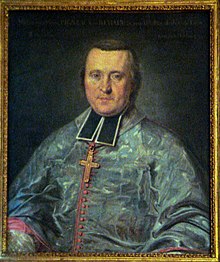Pigneau de Behaine
| Pigneau de Béhaine | |
|---|---|

The 1787 painting of Pigneau de Behaine by Maupérin is visible at the Paris Foreign Missions Society
|
|
| Religion | Roman Catholic |
| Personal | |
| Born | 1741 Origny-en-Thiérache, France |
| Died | 1799 Vietnam |
| Senior posting | |
| Based in | Vietnam |
| Title | Apostolic Vicararite of Cochin |
| Consecration | February 24, 1774 by Bernardo de São Caetano |
| Predecessor | Guillaume Piguel |
| Successor | Jean Labartette |
Pierre Joseph Georges Pigneau (2 November 1741 in Origny-en-Thiérache – 9 October 1799, in Qui Nhơn), commonly known as Pigneau de Béhaine (French: [piɲo də be.ɛn]), also Pierre Pigneaux and Bá Đa Lộc ( or ), was a French Catholic priest best known for his role in assisting Nguyễn Ánh (later Emperor Gia Long) to establish the Nguyễn Dynasty in Vietnam after the Tây Sơn rebellion.
Pierre Pigneau was born in Origny-en-Thiérache (later Aisne, France), where the family of his mother lived. His father's family owned a small estate named Béhaine, in the nearby parish of Marle. Despite the particule "de Béhaine" in his name, Pigneau was not of noble extraction, and it seems the particule first appeared only in the 1787 Treaty of Versailles.
Pigneau de Behaine was trained as a missionary and sent abroad by the Paris Foreign Missions Society (Séminaire des Missions Étrangères). He left France from the harbour of Lorient in December 1765, to work in southern Vietnam. He landed in Pondicherry, then a French possession in India, on 21 June 1766.
Pigneau had arrived just prior to the Burmese capture of Ayutthaya in Siam. After waiting for a few months in the Portuguese colony of Macau, Pigneau travelled on a Chinese ship to reach the small coastal town Hà Tiên in Cochinchina (Southern Vietnam) near the Cambodian border, set up by missionaries who had been displaced by the Burmese. He arrived there in March 1767.
...
Wikipedia
